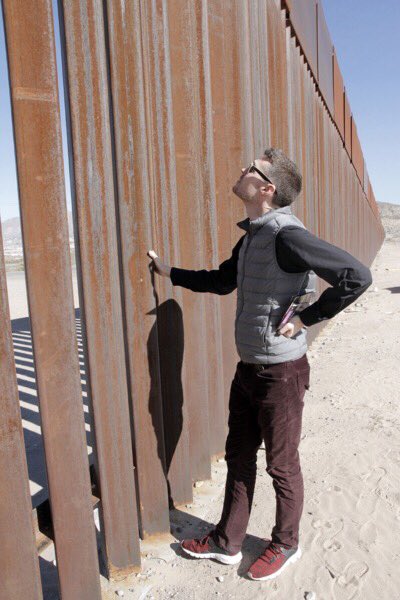by Nathan LeRud
As media attention focused on the US-Mexico border, a group of Episcopal priests from churches across the nation journeyed to Texas in December. We were in El Paso when Jakelin Caal Maquin, a seven-year-old detainee, died while in custody of US Border Patrol there. Hours before congressional representatives traveled to the sprawling, crowded detention center in Tornillo, we gathered at that same fence to pray.
We prayed because prayer is what had been asked of us. We met with mission partners –people engaged in relief work with thousands of asylum-seekers each week – and when we asked them what we could do, their first response was almost always, “please pray for us.” We found this request understandable but frustrating, as many of us believe that the knee-jerk “thoughts and prayers” that Americans extend in the face of crisis have grown thin. Nevertheless, we were asked to pray, and so we prayed. Prayer requires listening, and perhaps listening is the best place to begin any meaningful response to such an overwhelming crisis.
We gathered outside the detention center at Tornillo, we gathered in hotel rooms and church basements in El Paso, we gathered in relief centers and sanctuaries across the border in Juarez. We prayed, we sang, and we wept. We wept because what is happening at our borders is happening in our name, funded by our taxes, supported by our government. If the situation is going to change at US borders, then each of us must be part of that change. For Christians, this is not rocket science – it shouldn’t even be controversial: we’re named for a guy who is said to be the means of freedom and salvation not only for the inside crowd but for all people, in all times, in all places. The mercy and grace of Jesus do not discriminate between the documented and undocumented. My faith demands that I treat each person, regardless of citizenship or legal status, as my brother and my sister. All people are mi gente: all people are my people. That’s not liberal talking-points, that’s basic Christianity.
As media attention focuses on the colossal distraction of border wall politics, those of us who gathered to work and to pray determined to focus on those who are most directly affected by the refugee crisis: the migrants themselves, those who are caring for them, and those whose occupation puts them in impossible circumstances. ICE agents, relief workers, terrified refugees: all of these are mi gente, and I have come to believe that any attempt to frame human suffering as a partisan football is a sin. What I witnessed at the border is not a political issue but a humanitarian crisis: a crisis of our own making, of which Americans must first repent if we are to be a part of the change we seek.
Join me in prayer for those suffering at our borders, and as you pray, consider how you might be called to take action. The time has come.
The Very Rev’d Nathan LeRud is Dean of Trinity Episcopal Cathedral, Portland, OR
images provided by Trinity Cathedral

